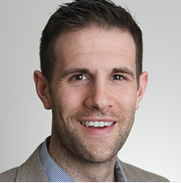
Lee Raby, Ph.D., is currently an assistant professor in developmental psychology at the University of Utah, where he also conducts research around the significance of a child’s early experiences with their caregiver. Lee earned his Ph.D. from the Institute of Child Development (ICD) in 2014. Below, he shares his experience at ICD and how it prepared him for a career in academia.
Why did you choose to attend the Institute of Child Development?
When I was applying to graduate schools, I knew I was interested in studying why individuals’ early experiences in their attachment relationships can have long-term consequences for their adjustment. I chose to attend the Institute of Child Development because it was the ideal program for being trained to research that question. ICD housed an unparalleled concentration of leading scholars and world-class research projects related to attachment theory and developmental psychopathology.
How did ICD prepare you for your current position as an assistant professor?
My graduate coursework prepared me to be an effective instructor by helping me develop an in-depth understanding of contemporary theoretical perspectives and modern research directions, as well as their connections to the longstanding questions and debates in developmental science. My experiences working directly with a number of eminent ICD faculty prepared me for my role as a researcher. My mentors encouraged me to think clearly about the intrinsic complexity of human development, to identify the most important unanswered questions in the area of research that interested me, and to develop a diverse set of methodological skills that would allow me to address those questions in novel ways.
How would you describe your research interests?
In many ways, I am still captivated in the same question as when I started my graduate training: why do early experiences with caregivers have a special significance for shaping individuals’ functioning across the lifespan? My research focuses on individuals’ mental representations about attachment relationships and their neurobiological functioning as potential explanations for the associations between individuals’ experiences of support or adversity and later behavioral outcomes. My research also involves children adopted internationally and children adopted domestically as infants. Research with these unique groups of children allow for more powerful tests of the potential importance of early attachment experiences and can lead to more effective interventions for at-risk children, which is an issue I care deeply about.
What advice do you have for current and/or future ICD Ph.D. students who are planning to pursue a career in academia?
The Institute is a special place. The faculty is composed of many of the top thinkers and researchers in the field who are passionate about mentoring the next generation of developmental scientists. My advice is to take advantage of all the opportunities ICD affords and to actively seek out experiences in many labs. This will provide you with the broad methodological training needed to probe the phenomena that interest you in unique ways. The knowledge, skills, and abilities acquired during this time will serve you well for years to come.



